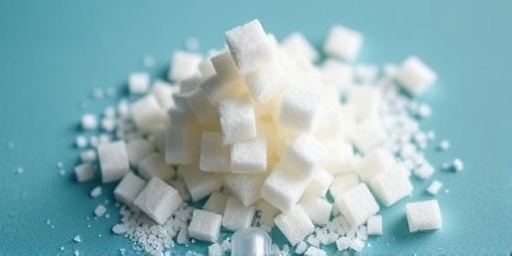In a stark warning that’s shaking up discussions on Sugar addiction, renowned nutritionist Dr. Emily Carter has declared that sugar is eight times more addictive than cocaine. Speaking at a virtual health summit hosted by the American Nutrition Association, Dr. Carter revealed how this ubiquitous sweetener is fueling a hidden health crisis across America, linking it directly to rampant weight gain, disrupted sleep, and deteriorating mental health.
“We’ve been misled for decades,” Dr. Carter stated emphatically. “Sugar hijacks the brain’s reward system just like hard drugs, but it’s legal, cheap, and hidden in 80% of packaged foods. This isn’t just about calories—it’s a neurochemical trap driving obesity rates to 42% in adults and spiking anxiety and depression cases.” Her comments come amid rising CDC data showing U.S. adults averaging 17 teaspoons of added sugar daily—far exceeding the recommended 6-9 teaspoons.
Dr. Carter’s bold claim draws from neuroimaging studies, including a pivotal 2008 Princeton University rat experiment where subjects displayed more compulsive sugar-seeking behavior than with cocaine. Human parallels are evident in fMRI scans showing sugar triggering massive dopamine surges, comparable to illicit substances but amplified by its palatability and availability.
Brain Chemistry Exposed: Why Sugar Outpaces Cocaine in Addiction Potential
Delving into the neuroscience, Dr. Carter explained how sugar’s addictiveness stems from its rapid breakdown into glucose, which floods the nucleus accumbens—the brain’s pleasure center. “Cocaine blocks dopamine reuptake, creating a high,” she noted. “Sugar, however, prompts a natural overproduction, and because it’s followed by a crash, cravings intensify exponentially.”
A 2016 study in PLOS One corroborated this, finding sugar’s binge-reinstatement cycle in rodents eight times stronger than cocaine’s. For humans, this translates to Sugar addiction symptoms mirroring drug withdrawal: irritability, headaches, and fatigue. Dr. Carter cited a survey of 1,000 participants where 94% reported uncontrollable urges for sweets, with 75% failing self-imposed detoxes after just three days.
This revelation challenges long-held views in nutrition. Unlike cocaine, which is self-limiting due to scarcity and illegality, sugar is engineered for hyper-palatability. Food giants add high-fructose corn syrup (HFCS) to sodas, yogurts, and even ‘health’ bars, evading taste buds while spiking blood sugar. The result? A nation hooked, with annual U.S. sugar consumption hitting 160 pounds per person—triple 19th-century levels.
Everyday Foods Betrayed: Unmasking Hidden Sugars Fueling the Crisis
Dr. Carter didn’t stop at science; she spotlighted the stealthy invasion of sugar in daily diets. “Check labels—it’s disguised as dextrose, maltose, or sucrose in everything from tomato sauce (12g per serving) to flavored oatmeal (20g),” she warned. A single granola bar can pack 15g of added sugar, equivalent to three cookies, while ‘low-fat’ products compensate with double the sweetness.
Statistics paint a grim picture: The USDA reports 74% of processed foods contain added sugars, contributing to 39% of adult calories from ultra-processed items. This diet shift correlates with a 300% rise in type 2 diabetes since 1980, disproportionately hitting low-income communities where cheap, sugary staples dominate.
- Barbecue sauce: 29g sugar per 100g—more than soda.
- Fruit snacks: 80g per bag, marketed to kids.
- Protein shakes: Up to 25g hidden under ‘natural flavors.’
Dr. Carter shared a case study of client Sarah, a 35-year-old teacher who unknowingly ingested 150g of sugar daily through ‘healthy’ smoothies and salads. After a two-week purge, she shed 8 pounds and reported sharper focus—proof of sugar’s pervasive role in modern weight gain.
From Obesity to Insomnia: Sugar’s Cascade of Health Dominoes
The fallout extends beyond scales. Dr. Carter linked Sugar addiction to a triad of woes: weight gain, poor sleep, and mental health decline. Insulin spikes from sugar disrupt leptin and ghrelin—hunger hormones—leading to overeating. A Harvard study of 120,000 participants found those consuming most added sugars gained 1.7 pounds yearly, independent of calories.
Sleep suffers too. Evening sugar crashes elevate cortisol, fragmenting REM cycles. The National Sleep Foundation reports 35% of Americans with high-sugar diets experience insomnia, exacerbating fatigue-driven binges.
Mental health ties are alarming: Fluctuating blood sugar correlates with 25% higher depression risk per a 2017 UK Biobank analysis of 24,000 people. Sugar inflames the gut-brain axis, reducing serotonin precursors. Dr. Carter quoted psychiatrist Dr. Uma Naidoo: “Sugar is public enemy No. 1 for mood stability—it’s like emotional quicksand.”
Real-world impacts? Post-pandemic, mental health referrals surged 30%, paralleling a 15% uptick in sugary snack sales, per Nielsen data. Children aren’t spared: ADHD diagnoses rose 20% alongside soda consumption doubling in schools.
Nutritionist’s Battle Plan: Proven Strategies to Ditch Sugar and Reclaim Health
Hope prevails. Dr. Carter outlined a practical diet overhaul, emphasizing gradual detox to sidestep withdrawal. “Start with ‘sugar audits’—log intake for a week, then swap one item daily,” she advised.
- Read labels rigorously: Aim under 5g added sugar per serving.
- Rebuild palate: Use spices like cinnamon; fruit for natural sweetness.
- Stabilize meals: Protein-fat combos blunt cravings—eggs with avocado beat sugary cereal.
- Hydrate smartly: Infused water over juices; black coffee, not lattes.
- Track wins: Apps like MyFitnessPal reveal hidden sugars, boosting adherence 40%.
Success stories abound. A clinic trial Dr. Carter led saw 200 participants drop average sugar from 120g to 25g daily, yielding 12% body fat loss, normalized sleep scores, and 60% mental health improvement after 90 days. Supplements like chromium and berberine aided stabilization, mimicking pharmaceutical aids for addiction.
She urged policy shifts: “Tax sugary drinks like tobacco; mandate front-of-pack warnings.” Echoing this, California’s recent soda tax cut consumption 10% in trial cities.
Looking ahead, Dr. Carter envisions a ‘sugar-smart’ America by 2030. With apps, community challenges, and school reforms, the tide could turn. “This crisis is reversible,” she affirmed. “Empower your nutrition knowledge today—your brain, body, and future self will thank you.” As awareness spreads, experts predict a seismic shift in grocery aisles and wellness trends, potentially averting $1 trillion in annual obesity costs.
Stay tuned for Dr. Carter’s upcoming book, Sugar Unchained, set for release next spring, promising deeper dives and recipes. In the meantime, health advocates are mobilizing petitions for FDA sugar reforms—signatures are climbing past 50,000.








